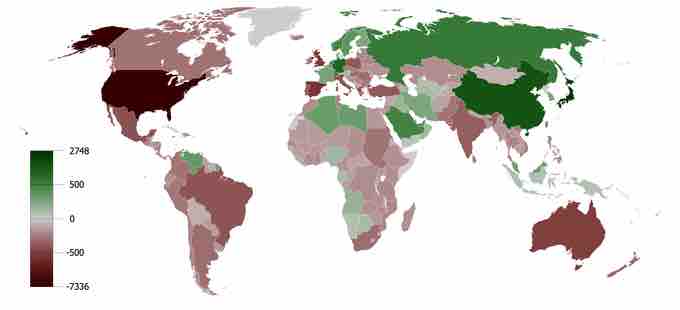Many policy makers who are proponents of trade protectionism make the argument that limiting imports will create more jobs at home. This argument is predicated on the idea that buying more domestically will drive up national production, and that this increased production will in turn result in a healthier domestic job market. Domestic industries will not have to compete with foreign producers, and are therefore protected from losing marketshare to cheaper imports.
Trade Balance
It is useful to consider the concept of a trade balance, or net exports, in the context of the jobs argument. It is interesting to look at to assess the extremity to which some nations are 'consumer nations' and others are 'producer nations'. The U.S. and China are a great example of opposite sides of the spectrum, where the trade balance is heavy on one side of the spectrum.

Trade Balances on a Global Scale
It is interesting to look at this graph and assess the extremity to which some nations are 'consumer nations' and others are 'producer nations. ' The U.S. and China are a great example of opposite sides of the spectrum, where the trade balance is heavily on one side of the spectrum.
In the U.S. this has created a dramatic push for trade protectionism policies; something the United States has not actively pursued in quite some time. The disastrous 2008 economic collapse via the clear-cut abuses by the banks, and the resulting drop in employment rates, has created an incredibly tangible social and political agenda to bring production back to domestic jobs from overseas. This sentiment towards protectionism is a direct result of the jobs argument in view of an imbalanced trade ratio, where more exports (production and jobs at home) are required to sustain the ongoing consumption of imports.
Outsourcing
Along similar lines, it is common practice for companies to identify strategic alliances abroad and send much of the production work to these locations. This is often a result of cheaper labor and easier systems of governance in those regions. The obvious perspective, from a policy making context, is that these are jobs lost to overseas competitors. While this perspective is often criticized for being short-sighted and against the modern economic view of free markets, it has resulted in policy makers providing incentives to 'bring jobs back home. '
This idea of limiting outsourcing in light of the protectionist jobs argument has resulted in governmental subsidies that work to offset the costs of manufacturing domestically (in the U.S. particularly). These subsidies are essentially grants or tax breaks for companies operating domestically and creating jobs, driving up employment rates via protectionist strategies.
Trade Restriction Strategies
Offsetting the threats of outsourcing and trade imbalances and driving domestic purchasing, and thus domestic production, is done through a variety of political vehicles. Most notable among them are:
- Import Quotas: This is the act of limiting the number of a certain good that can be purchasing from a given country, ensuring that domestic producers maintain a portion of the market share.
- Tariffs: Tariffs are fairly straight-forward, essentially taxes to bring goods into a given country. High tariffs will raise the cost for foreign producers to sell their goods in a domestic system, providing strategic advantages for local producers. One of the pitfalls of tariffs is the likelihood of retaliation, where the foreign government returns with similar tariffs. This will in turn damage global prospects for domestic suppliers.
- Anti-dumping:Anti-dumping legislation actively offsets the ability of low cost or highly subsidized producers in foreign countries to undercut prices in a domestic system. Dumping is the process of selling goods far below market value to drive out competition, often in pursuit of creating a monopoly.
- Subsidies: On the other end of the spectrum, and as noted above, governments can provide subsidies to domestic producers to lower their costs and drive up competitive ability. This can in turn create jobs.